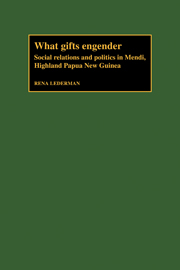Book contents
- Frontmatter
- Contents
- List of tables, figures, and maps
- Preface
- Acknowledgments
- 1 Mendi coming into view
- 2 Sem relations: solidarity and its limits
- 3 Twem: personal exchange partnerships
- 4 Gender ideology and the politics of exchange
- 5 Twem and sem in context
- 6 Sai le at Senkere: the politics of a Pig Festival
- 7 “Development” in Mendi
- Appendix A The research community
- Appendix B The “accounts sample” and some comments on research methodology
- Notes
- Glossary
- References
- Index
3 - Twem: personal exchange partnerships
Published online by Cambridge University Press: 04 August 2010
- Frontmatter
- Contents
- List of tables, figures, and maps
- Preface
- Acknowledgments
- 1 Mendi coming into view
- 2 Sem relations: solidarity and its limits
- 3 Twem: personal exchange partnerships
- 4 Gender ideology and the politics of exchange
- 5 Twem and sem in context
- 6 Sai le at Senkere: the politics of a Pig Festival
- 7 “Development” in Mendi
- Appendix A The research community
- Appendix B The “accounts sample” and some comments on research methodology
- Notes
- Glossary
- References
- Index
Summary
“If I depended on my own hand alone, I would be nothing; I would have no name.”
[Mendi big-man]Strictly speaking, twem is not a kinship term. One may call “twemol” a person whom one has met while traveling far from home, and with whom one has shared a smoke: One need only request a pearl shell or some other valuable from the other, and the other need only agree to give it. One may also refer to or address as “twemol” one's mother's or spouse's relatives and one's siblings’ or children's in-laws, although there are also more specific terms of address for all these people. But one does not call a clansman “twemol.“
As part of a compound verb, twem is used with (for example) the conjugated stem verb for “to speak” (twem kopu) meaning “to request” an item or generally “to talk twem.” People said that twem itself refers to exchange, to the circulation or the giving, receiving, and replacing of things (samting ikam igo in Melanesian pidgin). Ryan (1961: 66) defined twem adequately as a “delayed gift-exchange between individuals, signifying a more or less permanent socio-economic relationship.”
The significance of the Southern Highlands
Through the work of Mervyn Meggitt (1974), Andrew Strathern (1971), and others (e.g., Bulmer 1960, Rappaport 1968), Highland ceremonial exchange systems are almost as well known as the Trobriand kula and Northwest Coast potlatch exchanges with which they are sometimes compared. Based on research undertaken during the 1950s and 1960s, this ethnographic literature emphasized clan festivals and prestations, and not individual exchange partnerships.
- Type
- Chapter
- Information
- What Gifts EngenderSocial Relations and Politics in Mendi, Highland Papua New Guinea, pp. 62 - 116Publisher: Cambridge University PressPrint publication year: 1986



